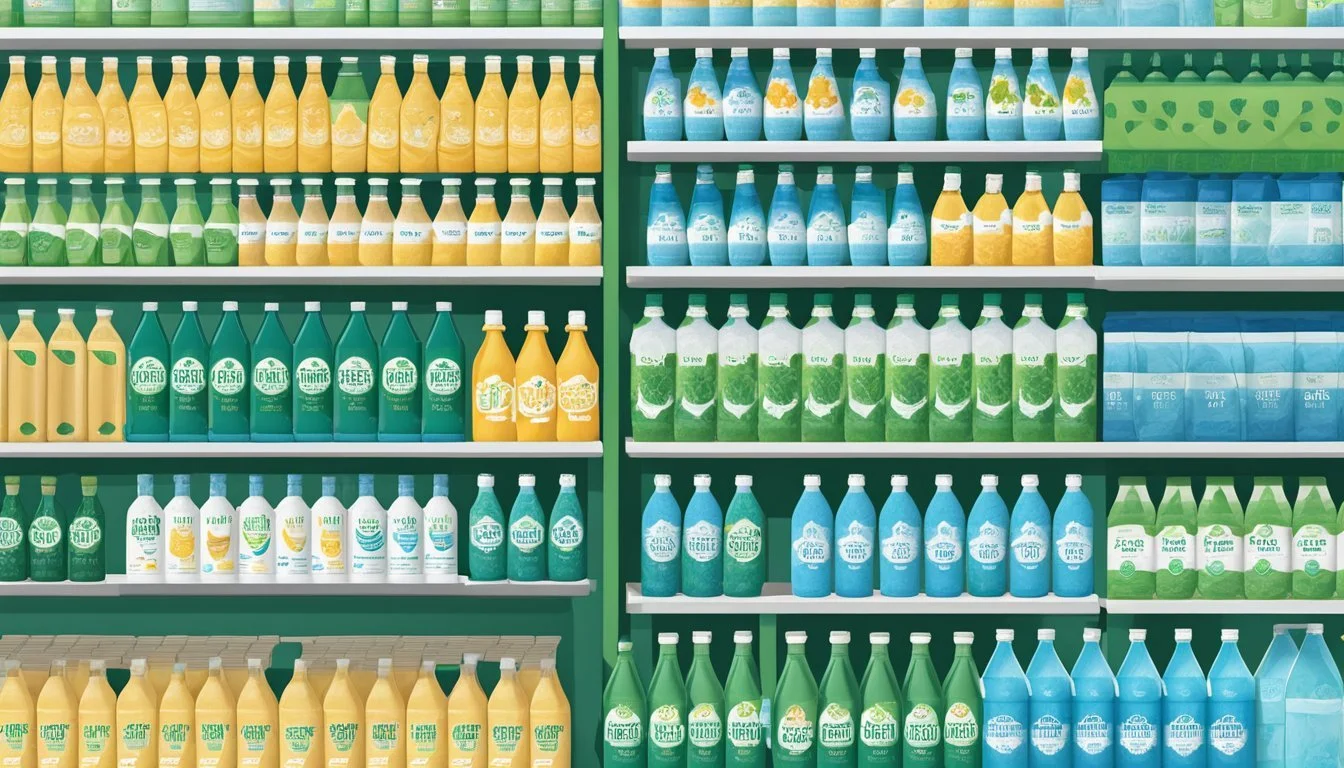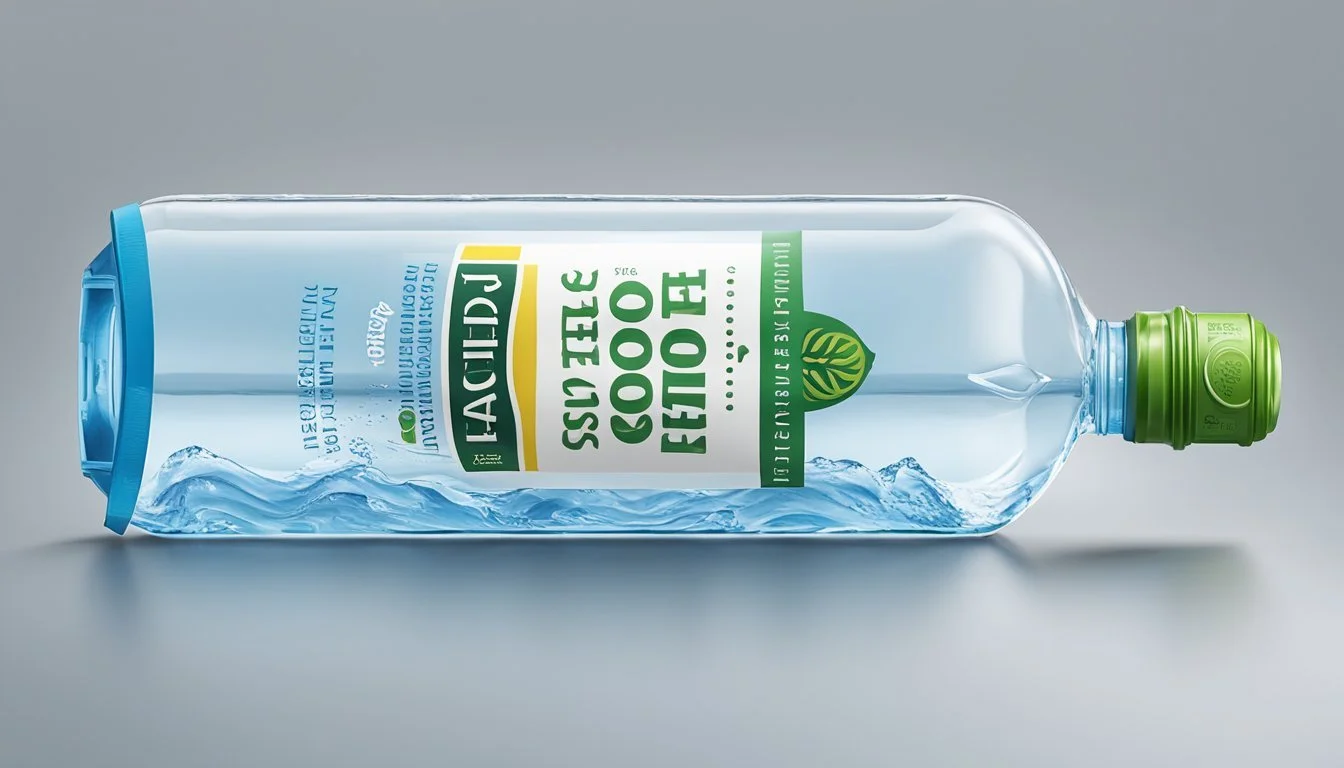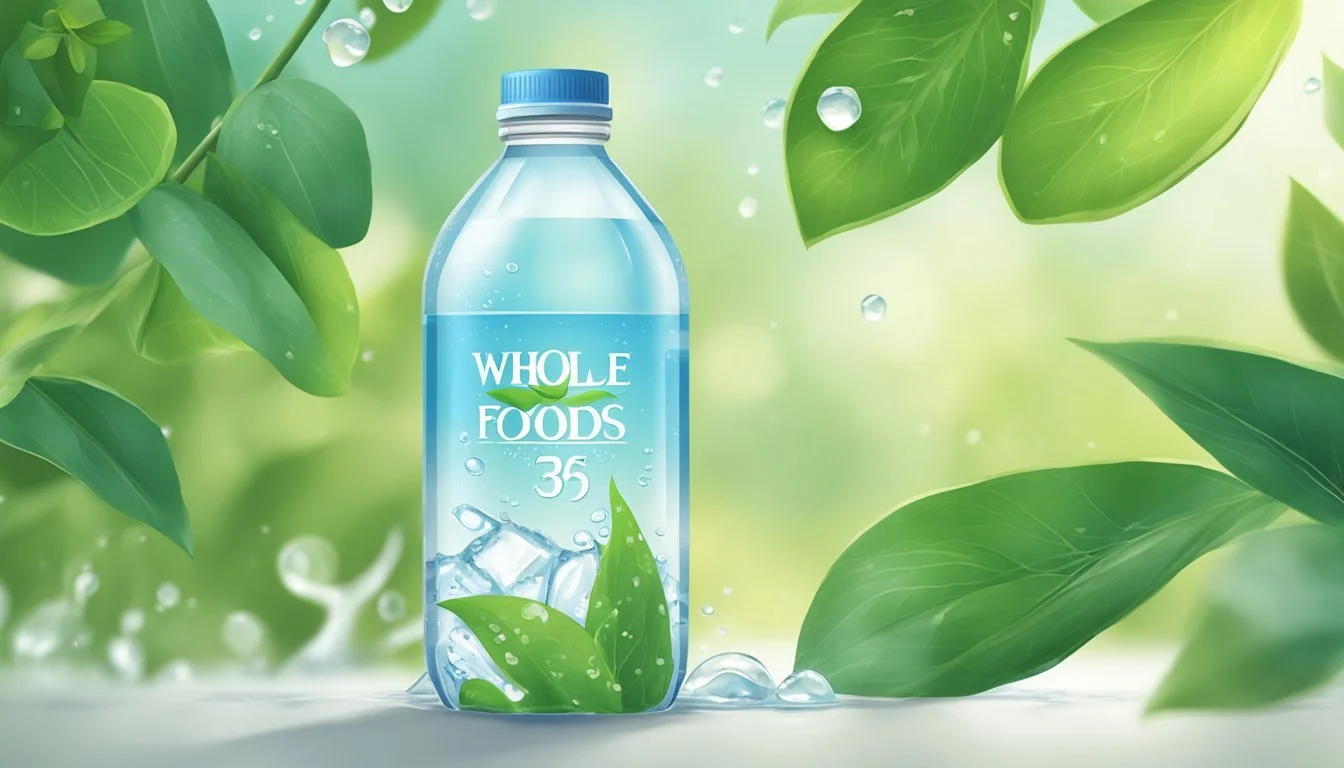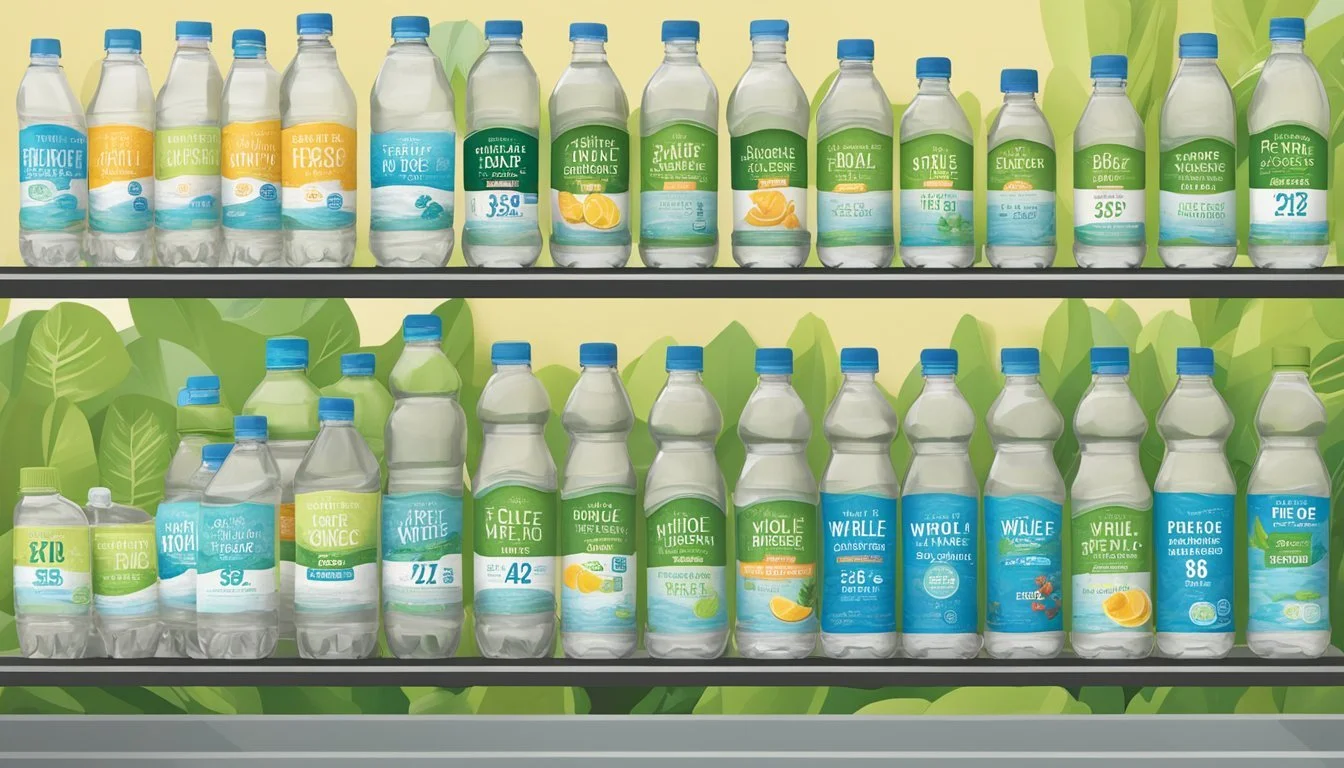Is Whole Foods 365 the Best Bottled Water?
Affordable Quality for Everyday Hydration
Whole Foods 365 bottled water offers a convenient and refreshing hydration option for shoppers seeking quality spring water. The 365 brand spring water comes from protected mountain sources and undergoes double filtration to ensure purity and taste. Available in various sizes from 16.9-ounce bottles to 1-gallon jugs, this water provides a reliable choice for those looking to quench their thirst.
Whole Foods Market carries several varieties of 365 branded water products, including spring water, alkaline water, and electrolyte-enhanced options. These choices cater to different preferences and health-related decisions consumers may consider when selecting bottled water. The 365 line aims to provide value while maintaining the quality standards Whole Foods is known for.
As with any bottled water product, environmental considerations come into play. While plastic bottles offer portability, some consumers may opt for larger containers or reusable bottles to reduce plastic waste. Whole Foods also stocks other water brands and sparkling options, giving customers a range of choices to suit their hydration needs.
Whole Foods 365 Brand Overview
Whole Foods 365 is the private label brand of Whole Foods Market, a prominent natural and organic grocery chain. The brand was launched in 1997 under the name "365 Everyday Value" to offer high-quality products at more affordable prices.
The 365 brand encompasses a wide range of products, including bottled water. This line aims to provide consumers with cost-effective alternatives to national brands without compromising on quality or Whole Foods' standards.
Products under the 365 label must meet Whole Foods' strict quality criteria. These include:
No artificial flavors, colors, or preservatives
Non-GMO ingredients
Environmentally conscious packaging
The 365 bottled water comes in various options:
Spring water
Purified water
Alkaline water
Whole Foods 365 has built a reputation for reliability and value among health-conscious consumers. Many shoppers trust the brand as a more affordable entry point into organic and natural products.
Consumer perception of 365 products is generally positive. Customers appreciate the balance of quality and affordability. The brand's commitment to transparency in sourcing and production practices also contributes to its favorable image.
Product Range
Whole Foods 365 offers a diverse selection of bottled water options to meet various consumer preferences and needs. Their product range includes spring water, purified water, alkaline water, and electrolyte-enhanced water.
365 Spring Water
365 Spring Water is sourced from natural springs and undergoes minimal processing. It contains naturally occurring minerals that contribute to its crisp taste. This water is available in various sizes, from single-serve bottles to larger gallon jugs.
The spring water is tested regularly to ensure purity and compliance with quality standards. It's a popular choice for those seeking a natural, unaltered water option.
Purified Water
Whole Foods 365 Purified Water undergoes a rigorous filtration process to remove impurities and contaminants. This process typically includes reverse osmosis and other advanced purification methods.
The result is clean, crisp-tasting water free from unwanted substances. Purified water is ideal for those concerned about potential contaminants in their drinking water. It's available in multiple sizes to suit different needs.
Alkaline Water
365 Alkaline Water has a pH level higher than regular drinking water, typically around 9.5. This elevated pH is achieved through an ionization process that increases the water's alkalinity.
Proponents of alkaline water believe it may offer health benefits, though scientific evidence is limited. The 365 Alkaline Water is competitively priced compared to other premium alkaline water brands, making it an accessible option for those interested in exploring alkaline beverages.
Electrolyte Water
Whole Foods 365 Electrolyte Water is enhanced with minerals like sodium, potassium, and magnesium. These added electrolytes aim to support hydration, especially during or after physical activity.
The electrolyte water has a subtle flavor and is designed to replenish minerals lost through sweat. It's marketed as a natural alternative to sports drinks, without added sugars or artificial ingredients. This product appeals to active individuals and those looking for enhanced hydration options.
Health and Nutrition
Whole Foods 365 bottled water provides essential hydration while offering potential health benefits. The water contains minerals and electrolytes that support bodily functions, maintains a balanced pH level, and contributes to overall well-being.
Minerals and Electrolytes
Whole Foods 365 bottled water contains naturally occurring minerals and electrolytes. These include calcium, magnesium, and potassium, which play crucial roles in the body's functioning.
Calcium supports bone health and aids in muscle contraction. Magnesium contributes to energy production and helps regulate nerve function. Potassium is essential for maintaining proper fluid balance and supporting heart health.
The presence of these minerals in the water can help replenish electrolytes lost through daily activities and exercise. This balance is important for optimal hydration and bodily functions.
pH Levels and Alkalinity
The pH level of Whole Foods 365 bottled water is typically neutral, around 7.0. This makes it compatible with the body's natural pH balance. Some variations, like the 365 Everyday Value Alkaline Water, are ionized to a higher pH of 9.5+.
Alkaline water proponents claim it may help neutralize acid in the body. However, scientific evidence supporting these claims is limited. The body generally maintains its own pH balance effectively.
Drinking water with a neutral to slightly alkaline pH can be refreshing and may contribute to overall hydration without disrupting the body's natural processes.
Hydration and Health Benefits
Proper hydration is essential for numerous bodily functions. Whole Foods 365 bottled water provides a convenient and reliable source of hydration. Regular water intake supports:
Temperature regulation
Nutrient transportation
Waste removal
Joint lubrication
Staying hydrated can improve cognitive function, physical performance, and skin health. It may also help prevent headaches and reduce the risk of kidney stones.
For those engaging in intense physical activity, the electrolytes in 365 Everyday Value Electrolyte Water can aid in replenishing lost fluids and minerals. This can help maintain proper muscle function and reduce the risk of dehydration.
Safety and Quality Standards
Whole Foods 365 bottled water adheres to strict safety and quality standards. The brand employs various processes and meets regulatory requirements to ensure its water is safe for consumption.
Filtration and Purification Processes
Whole Foods 365 bottled water undergoes rigorous filtration and purification. The process typically includes reverse osmosis, which effectively removes contaminants and impurities. This method filters out particles, bacteria, and potentially harmful substances.
UV light treatment is often used to eliminate any remaining microorganisms. Ozonation may also be employed as an additional disinfection step. These processes work together to produce clean, safe drinking water.
The brand likely conducts regular testing to verify the effectiveness of its purification methods. This ensures consistent quality across all batches of bottled water.
FDA and EPA Regulations
Whole Foods 365 bottled water must comply with FDA regulations for bottled water. These rules set maximum contaminant levels and require regular testing for various substances.
The FDA standards are often as stringent as EPA regulations for tap water. This includes limits on potentially harmful chemicals, such as PFAS. The brand is required to test for these substances and ensure levels remain below legal thresholds.
Labeling requirements are also enforced by the FDA. Whole Foods 365 must accurately represent the source and treatment of its water on the packaging.
International Bottled Water Association (IBWA) Certification
IBWA certification provides an additional layer of quality assurance for bottled water brands. While it's unclear if Whole Foods 365 specifically holds this certification, many reputable brands do.
IBWA certification involves annual, unannounced plant inspections. These audits check for compliance with the association's strict standards. They examine the entire production process, from source to bottle.
Certified brands must meet or exceed FDA regulations. The IBWA also sets standards for plant design and construction, sanitary operations, and product safety.
Packaging and Environment
Whole Foods 365 bottled water comes in plastic packaging, raising concerns about environmental impact and potential health effects. The brand's approach to bottling and sustainability practices merit examination.
Plastic Bottles and BPA
Whole Foods 365 water bottles are made from plastic. The company uses BPA-free plastic for its bottles, addressing consumer health concerns. BPA (Bisphenol A) is an industrial chemical used in some plastics that has been linked to potential health issues.
The 365 brand opts for PET (polyethylene terephthalate) plastic, which is widely considered safe for food and beverage packaging. This material is lightweight, shatter-resistant, and recyclable.
Environmental Impact of Bottled Water
The production and disposal of plastic water bottles contribute to environmental challenges. Whole Foods has implemented initiatives to reduce plastic waste, but bottled water remains a concern.
Single-use plastic bottles require significant resources to manufacture and transport. Many end up in landfills or pollute waterways, taking hundreds of years to decompose.
Whole Foods encourages recycling of their bottles. However, only a small percentage of plastic bottles are actually recycled. The company has explored alternative packaging options and promotes reusable water bottles in their stores.
Consumers can reduce environmental impact by choosing tap water or filtered water in reusable containers when possible. For those who prefer bottled water, proper recycling is crucial to minimize waste.
Purchase Options and Pricing
Whole Foods 365 bottled water offers various purchasing options to suit different consumer needs. Prices are competitive for the quality provided, with several ways to save money.
In-Store Availability and Pricing
Whole Foods stores stock 365 bottled water in multiple sizes. The 16 fl oz bottles are commonly available, priced competitively with other premium water brands. Larger 1-gallon jugs provide a more economical option for bulk purchases.
Prices may vary slightly between locations. Some stores offer multi-pack options, which can reduce the per-bottle cost. Checking in-store displays or asking staff can help locate the best deals.
Online Orders and Deliveries
Whole Foods' website and Amazon allow easy online ordering of 365 bottled water. Delivery options include home delivery and in-store pickup.
Online prices often match in-store rates. Bulk purchases may qualify for discounts or free shipping. Amazon Prime members can benefit from additional savings and faster delivery options on select 365 water products.
Discounts and Promotions
Whole Foods regularly offers promotions on 365 bottled water. These can include percentage discounts, buy-one-get-one deals, or reduced prices when purchasing multiple units.
Prime members receive extra savings on select 365 products. Signing up for Whole Foods' newsletter can provide alerts about upcoming sales. Some stores offer case discounts for larger quantity purchases.
Budget-conscious shoppers can look for in-store specials or time their purchases during promotional periods to maximize savings on 365 bottled water.
Labeling and Information
Whole Foods 365 bottled water products feature comprehensive labeling that provides consumers with essential details about the water's source, contents, and quality. The packaging includes key information to help customers make informed choices.
Nutritional Information and Ingredients
The labels on Whole Foods 365 bottled water display a concise Nutrition Facts panel. This panel typically shows zero calories, fat, sodium, carbohydrates, and protein per serving. The ingredients list is straightforward, containing only purified water or spring water, depending on the specific product.
Some 365 water varieties may include added minerals for taste. These are clearly listed on the label. The packaging also states the water's pH level, especially for alkaline water products.
Labels and Certification Marks
Whole Foods 365 water bottles feature several important labels and certification marks. The NSF certification mark is often present, indicating that the water meets specific quality and safety standards. This third-party certification provides assurance to consumers about the product's integrity.
The labels also include information about the bottling location and water source. Recycling symbols and instructions are prominently displayed to encourage proper disposal. Some 365 water products may carry additional certifications, such as kosher or organic labels, where applicable.
Directions for storage and consumption are provided on the packaging. These typically advise keeping the water in a cool, dry place and consuming it by the date printed on the bottle for optimal freshness.
Additional Considerations
Whole Foods 365 bottled water offers options for various dietary needs and health concerns. Consumer awareness and education play crucial roles in making informed choices about bottled water consumption.
Special Diets and Medical Concerns
Whole Foods 365 bottled water caters to specific dietary requirements. It contains no added sugars or sodium, making it suitable for low-sodium diets. The water is cholesterol-free, aligning with heart-healthy eating plans.
For those with medical conditions requiring mineral-controlled intake, 365 water provides clear labeling of mineral content. This transparency allows individuals to make informed decisions based on their healthcare needs.
Some 365 water options are fortified with electrolytes, benefiting those who need extra hydration due to medical reasons or intense physical activity.
Consumer Advocacy and Education
Consumer advocacy groups in the USA promote awareness about bottled water quality and environmental impact. They encourage comparison between bottled water and tap water, highlighting potential cost savings and reduced plastic waste.
Educational initiatives focus on reading water bottle labels to understand source, treatment, and mineral content. These efforts aim to help consumers make informed choices about their drinking water.
Advocacy groups also push for stricter regulations on bottled water quality and labeling standards. This ensures that brands like Whole Foods 365 maintain transparency in their production and sourcing practices.







